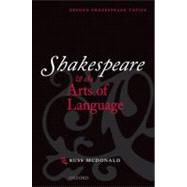Shakespeare and the Arts of Language
, by McDonald, Russ- ISBN: 9780198711711 | 0198711719
- Cover: Paperback
- Copyright: 4/5/2001
Oxford Shakespeare Topics provide students and teachers with short books on important aspects of Shakespeare criticism and scholarship. Each book is written by an authority in its field, and combines accessible style with original discussion of its subject. Notes and a critical guide tofurther reading equip the interested reader with the means to broaden research. For the modern reader or playgoer, English as Shakespeare used it can seem alien and puzzling: vocabulary and grammar are in transition, pronouns and verb-forms can seem unfamiliar. Moreover, the conventions of poetic drama may also pose an impediment. Shakespeare and the Arts of Language providesa clear and helpful guide to the linguistic and rhetorical dimensions of the plays and poems. Written in a lucid, non-technical style, the book starts with the story of how the English language changed throughout the sixteenth century. Subsequent chapters define Shakespeare's main artistic tools and illustrate their poetic and theatrical contributions: Renaissance rhetoric, imagery andmetaphor, blank verse, prose speech, and wordplay. The conclusion surveys Shakespeare's multiple and often conflicting ideas about language, encompassing both his enthusiasm at what words can do for us and his suspicion of what words can do to us. Throughout, Russ McDonald helps his readers to appreciate a play's concerns and theatrical effects by thinking about its language in relation to other writings of the period. He also emphasizes pleasure in the physical properties of Shakespeare's words: their colour, weight, and texture, the appealof verbal patterns, and the irresistible power of intensified language.






